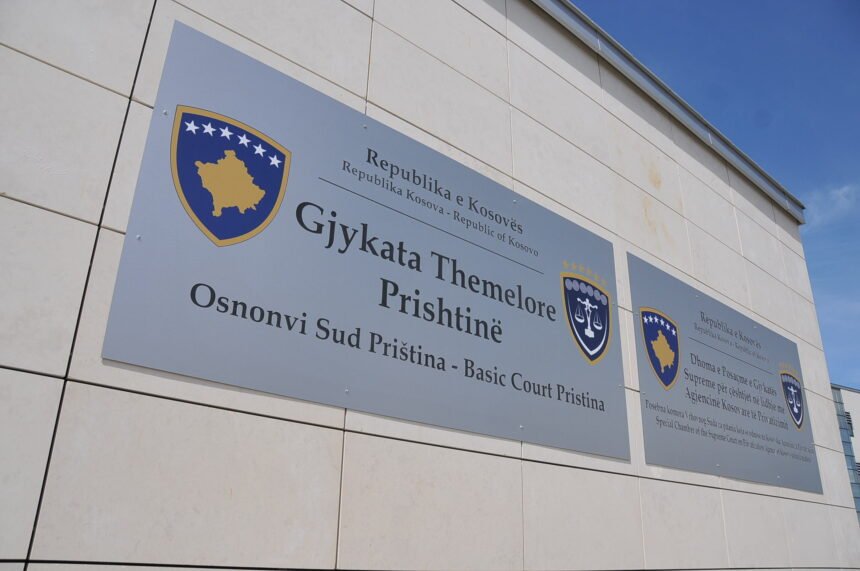At the Basic Court in Prishtina, this Friday, witness Shaban Gashi testified in the trial of Millorad Gjoković, who stands accused of war crimes. Before the judicial panel, Gashi described the mistreatment he endured at the hands of Serbian forces.
He recounted events that began on May 7, 1999, in the village of Ozdrim and ended with his imprisonment for more than six months in Leskovac prison, reports Betimi për Drejtësi.
According to Gashi, on the morning of May 7, 1999, gunshots were heard, followed by knocks on the windows of his house. Initially, he thought it might be neighbors, but soon Serbian forces entered the yard.
“On May 7, there were gunshots, and after that they came to the window and knocked on the door. I thought it might be neighbors, but when I looked, the entire yard was full of police and paramilitaries with colored scarves. They ordered us to leave the house immediately. They took my family and me, tied with scarves, faces smeared, weapons pointed at us as if they were about to shoot. They lined us up, about 15–16 of us, and took us slowly to the yard of the village clinic,” Gashi testified.
He further recounted that they were lined up against a wall, and that his wounded neighbor, H.G., who has been missing since that day, was brought there. His mother remarked that H.G. was about to die, to which a policeman replied in Serbian:
“Let him die, then he dies for the Republic of Kosovo.”
After that, H.G. was taken to hospital, but Gashi testified he never saw him again.
That day, Serbian forces held them for three days in the depot of his neighbor, a car mechanic known as “Shemi’s shed,” before transferring them to the detention center in Peja, where Gashi remained for one month, and later to Leskovac prison. Throughout this period, he said, they were beaten, mistreated, and poorly fed. On the way to Leskovac, they were even forced to sing in Serbian.
He also described the mistreatment inside Leskovac prison, stating that whenever they were taken outside for walks, they were beaten. He recalled one incident where they were disinfected and then given bread:
“They sprayed us supposedly for infection, and after 15 minutes they brought us bread. We ate more grass than bread; I don’t know how we survived,” said Gashi.
Regarding the identification of individuals on May 7, 1999, Gashi said he recognized Momo Vukotić, but could not identify others as all detainees were forced against the wall with their heads down.
Concerning the accused, Gjoković, Gashi stated that he worked as a reserve policeman in the “local office” in Vitomirica, and that he frequently saw him armed and carrying a rubber baton on the road to Peja.
The witness concluded his testimony with an appeal for justice:
“I ask that justice be served,” Gashi said.
According to the indictment filed on June 23, 2023, Millorad Gjoković is accused that in 1998–1999, in the village of Ozdrim (Municipality of Peja) and in surrounding villages, as a member of Serbian police and military forces, he committed killings, raids, beatings, mistreatment, arrests, torture, inhumane and degrading treatment, enslavement, expulsions, and deportations of dozens of Albanian civilians. He is also accused of looting, burning, and destroying the homes of the civilian Albanian population.
The indictment further states that from the northern side of the village of Ozdrim, along the Peja–Mitrovica regional road, the regular army entered, while from the western side, bordering Vitomirica, paramilitary groups mixed with special military units entered, firing upon the civilian population. As a result, six Albanian civilians were killed: I.K, Sh.K, E.M, R.Sh, Z.Sh, and M.H. Three others – A.G, H.G, and M.G – were wounded, transported to Peja hospital, then executed and buried in the village of Lutogllavë. In addition, five Albanian civilians – R.K, Z.K, A.K, A.K, and A.Sh – were killed during the offensive, but their bodies have never been found and they remain listed as missing persons.
Gjoković is thus charged, as a co-perpetrator, with the criminal offense of “War Crimes against the Civilian Population”, punishable under Article 142 in conjunction with Article 22 of the Criminal Code of the former Socialist Federal Republic of Yugoslavia, which was in force at the time of the commission of the crime.







